“Ooooh look it’s a troop of baboons!” Theresia, a Form 2 student, shouts with excitement.
Theresia and her fellow members of the girls’ school Student Government, accompanied by teachers, set off early for an exciting adventure – an excursion to Lake Manyara National Park!
Driving through a dense, evergreen forest of the national park that is situated between the Arusha and Manyara regions in Northern Tanzania, students were thrilled to spot wild animals: zebras, antelopes, wildebeest, elephants, giraffes, monkeys and baboons.
As a reward for their outstanding leadership performance, the excursion aimed to enable students to understand, learn from, and examine the natural world.
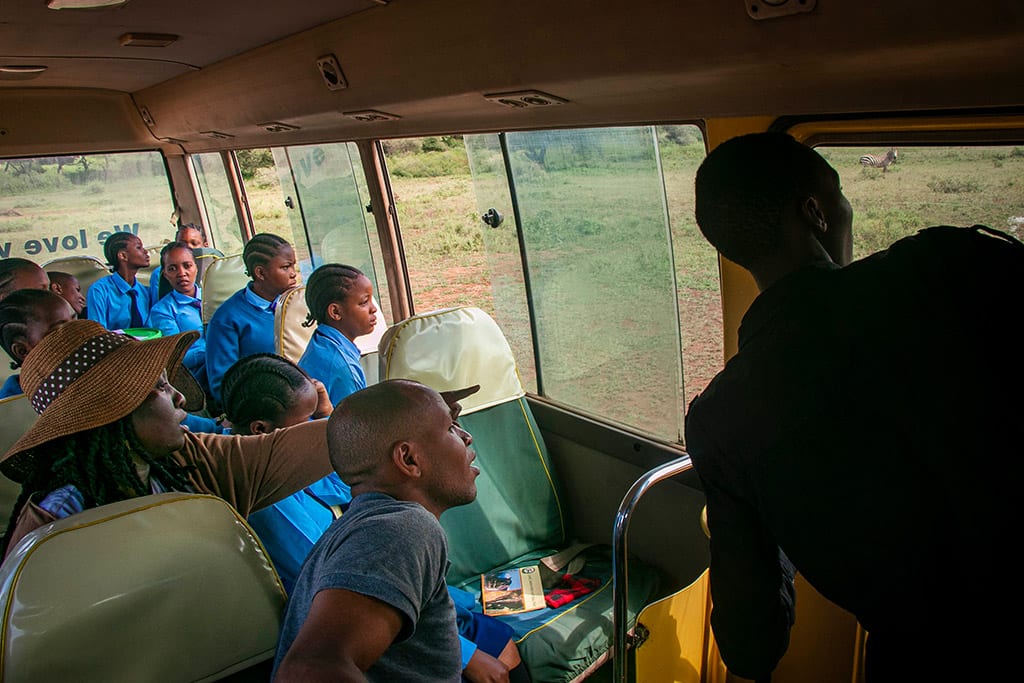
“The reason we planned this trip is to first show appreciation for their time spent as leaders in the school government body and second, to motivate and empower the students with leadership skills,” explains Ms Judith, St Jude’s Girls’ Secondary School Deputy Headmaster – Operations.
The outgoing Students’ Government at the girls’ secondary school retired from their duties early this month, paving the way for the new government to be sworn in soon.
The Student Government is elected by fellow students each year. Candidates from different year levels who would like to be part of the government collect and fill forms.
Once the forms are returned, the names are sorted and put into different posts that the candidates are contesting for. Thereafter candidates get interviewed by teachers and other reigning government leaders before they start seeking votes from their peers.
With complete transparency, elections are highly supervised by teachers and other incumbent student leaders. Students are given forms that they cast in a ballot to vote for their favourite candidates in situated poll stations. The votes are later collected from the poll stations and submitted to the election committee counting and announcing the winners.
The student government body at St Jude’s is run entirely by students. They represent students’ voices, follow up on students’ welfare and discipline as well as the students’ academic progress.
“The Student Government is a bridge between students and teachers. We want to show this group that we value their contribution. We also expect them to become great ambassadors and mentors to the incoming student government,” Ms Judith adds.
“We chose Lake Manyara National Park because of its unique features and the abundance of animals that live in groups like elephants, baboons and antelope families. I believe through animal behaviour, the students will gain inspiration, and I hope they’ll use this time to reflect on their leadership skills,” says Ms Judith.
The Student Government comprises of members from different year levels led by a head girl, a head boy, and a general secretary. The remainder of the members, called prefects, oversee other disciplines such as academics, discipline, security, and safety.
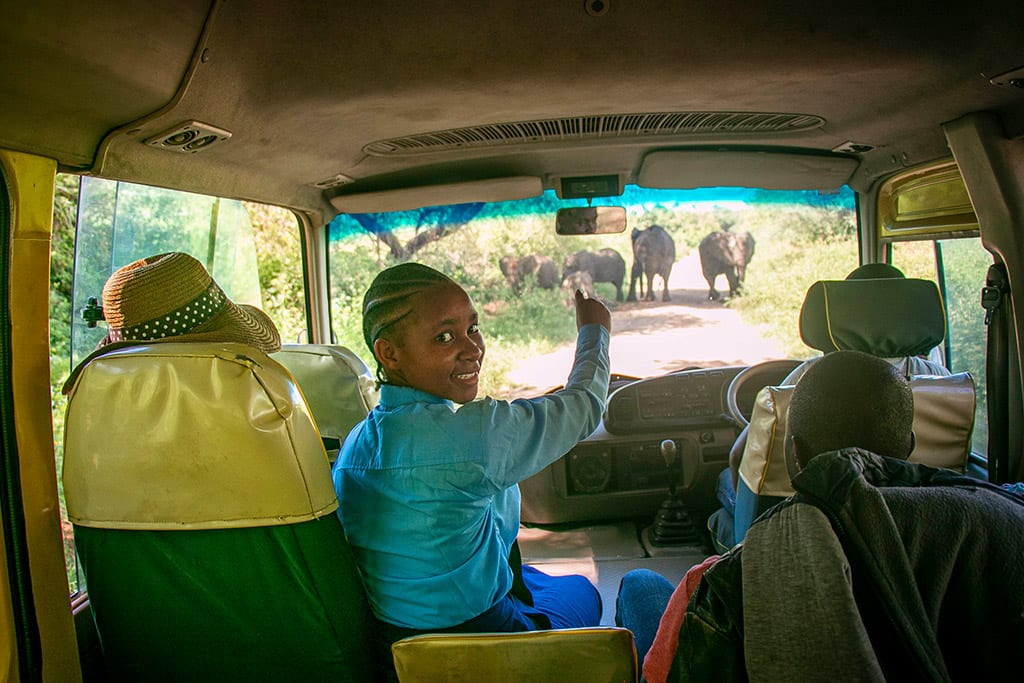
Theresia, who served as a security prefect in the Student Government, was wide-eyed with anticipation during the excursion.
“What I learnt from this motivational trip is animal families, behaviour and their heirarchical roles. As a security prefect I had so many questions about how animals defend themselves and it was interesting to know how each animal family has its own way of defending,” Theresia shares.
The students were surprised to learn that baboons have different hierarchies within their troops, and its members are highly coordinated, whether it be for feeding, mating, or grooming.
“I enjoyed learning about baboons and how they behave. I was so intrigued when the tour guide was talking about how social these animals are and how they work together to look for food and protect each other,” says Mwasiti, one of Theresia’s Student Government peers.
“This trip has taught me that through animals we can learn a lot. For example, a big lesson I got is from zebras. These animals stand side-by-side but face opposite directions, one resting its chin on the back of the other, an act that allows them to groom each other while keeping an eye out for predators. To me this shows cooperation and I believe this is an important skill if you want to be a good leader,” Mwasiti reflects.
Leadership is one among many skills that St Jude’s instils into the students, which will help them lead their families and communities with respect, responsibility, honesty and kindness and become future leaders of Tanzania.
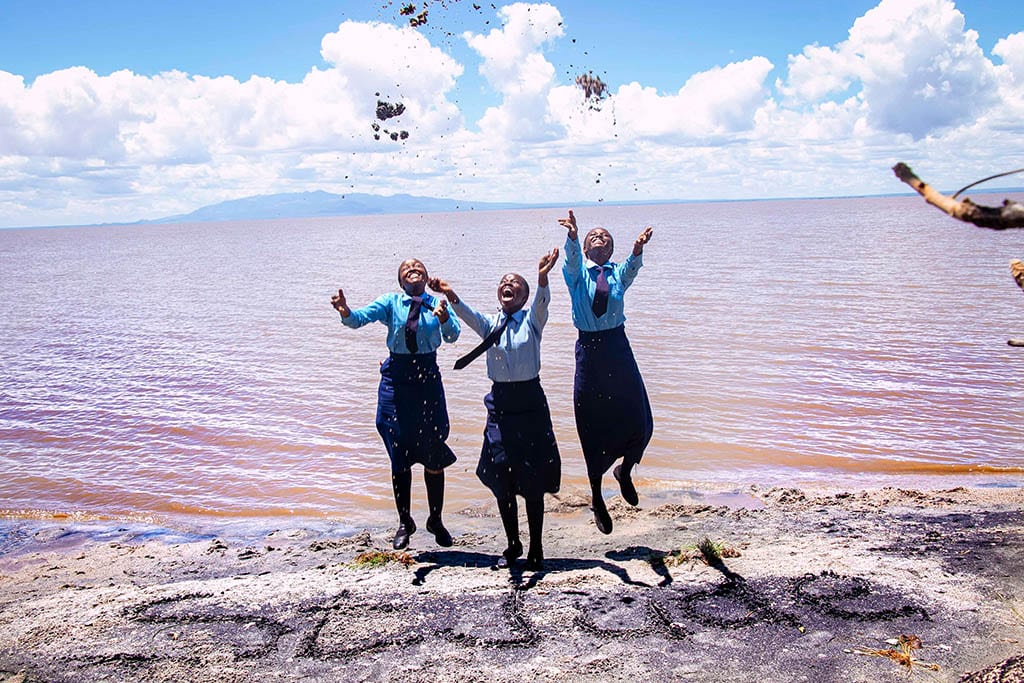
St Jude’s recently launched a new program called St Jude's Spirit as a way to appreciate and share stories about people all over the world who go above and beyond to help nurture the future moral and intellectual leaders of Tanzania. All St Jude’s stakeholders – supporters, students, families, alumni, local community and staff – can be a part of St Jude’s Spirit.
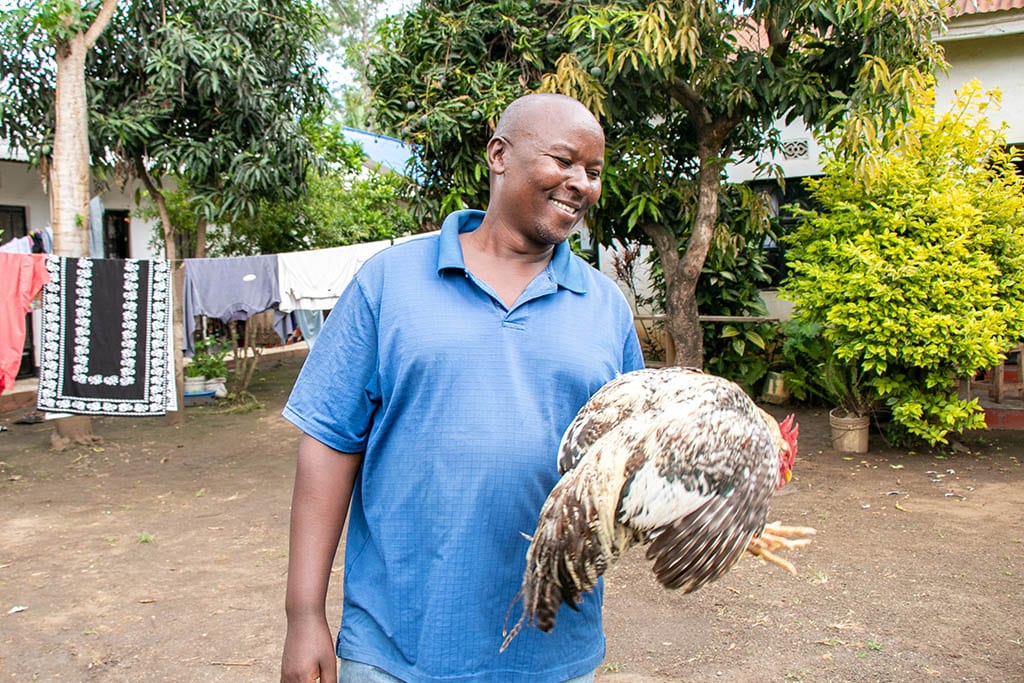
Amos is one of many local community members who performs small acts of service that leave a lasting impact on St Jude’s community.
With a chicken in his hand, Focus, who works closely with the community for St Jude’s, knocks on the door of Amos at his home near Sisia Campus.
Focus surprised Amos by gifting him and his family a chicken – a special present in Tanzania. It was rewarded to them for their constant kindness towards St Jude’s. For years, Amos, who live in Moivaro, right near the girls’ school boarding campus, have been generously keeping a lookout and stopping anyone who intends to disturb the secondary girls.

“When you give, you make a difference, and no matter how small the act of kindness is, it deserves to be appreciated,” says Focus, who engages and develops relationships with the local community.
Focus has been visiting members of the local community who have contributed towards the school, the students and all its members, or have given what they can to strengthen the mission and vision of St Jude’s.
“The Spirit Program is a movement. Through this program, we aim to give back to the community by first recognising and bringing together our key stakeholders, and second, by rewarding our stakeholders for their continuous generosity,” says Focus.
“Each stakeholder has a vital role to play in this program. Stakeholders can participate in this program financially or non-financially. For example, we recently gave our token of appreciation to some of our suppliers for being part of the school community for a long time.”
The Spirit Program serves as an effective way of highlighting the efforts made by St Jude’s community, while also serving as the glue that solidifies St Jude’s community.
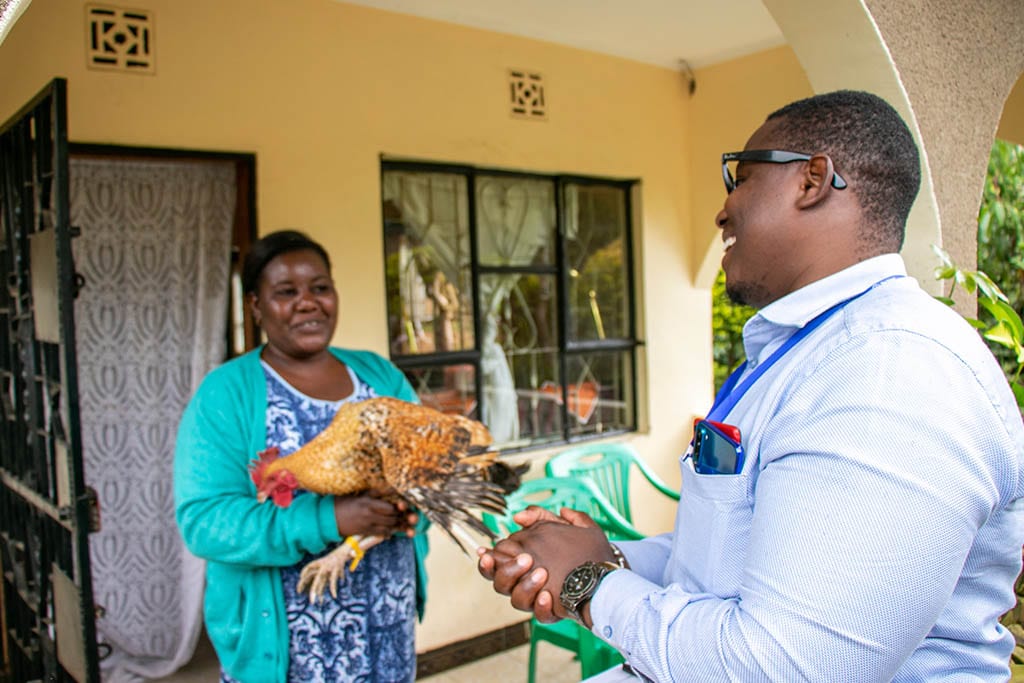
In the coming weeks, staff will also be invited to participate in the program either financially or non-financially. Staff can decide to either volunteer, donate through salary sacrifice or a pre-determined amount that can be deducted every month.
“We will encourage staff to participate by showing financial generosity, and we will encourage staff to spread the word in their communities and around their neighbourhood about St Jude’s,” Focus explains.
“We have flyers in school buses. Staff can take these brochures and educate people in their communities about the good work being done at St Jude’s. This is an amazing movement because really any generosity through thoughtfulness and goodwill is appreciated here at St Jude’s.”
St Jude’s community is grateful for the continuous support we receive from thousands of people worldwide… it is people like you, and all who contribute to building St Jude’s Spirit, who are fighting poverty through education. St Jude’s Spirit program will also be launching to all our international supporters this year, so keep an eye out on how you can take part in this movement.
“What makes a good board member?… interesting choice of question,” ponders Ms Bernadette, Chairperson for the Secondary School Board at Smith Campus.
Sitting on her porch, relaxed and poised, Ms Bernadette shares her experience.
“I’m a retired public officer. I worked as an education administrator in the government for 41 years and I believe with this background and experience, I have been privileged to chair the board at Smith Campus since 2017,” she says with a smile.
The School of St Jude complies with statutory requirement by operating under three boards; Primary School Committee for the registered primary school and Secondary School Board for each of the registered secondary schools at St Jude’s. These bodies are made up of staff, parents and local community representatives and professionals from different background.
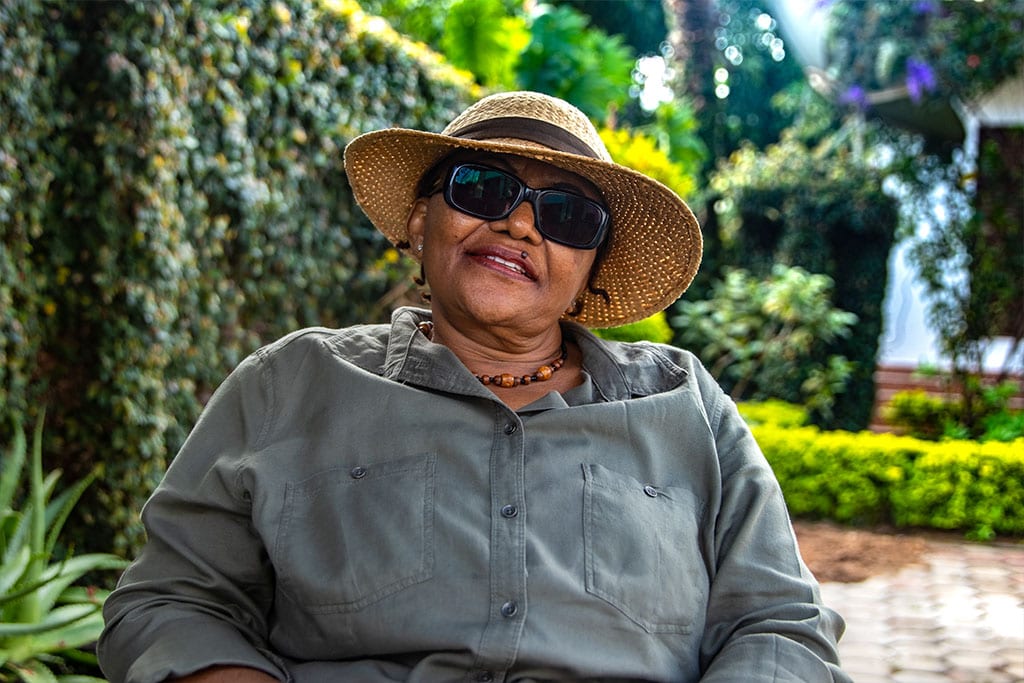
“I remember I was one of the three people who cut the cake when Gemma first opened the school gates back in 2002. It was a really special day for me and especially for Gemma,” she chuckles.
“I was the District Education Officer then so oversaw many schools in my district and was excited to see a new school opening for our community,” she adds.
With a background in education, Ms Bernadette has been a great asset to the school, leading the board with passion, firm principles and making sure the school adheres to Tanzania education policy.
“My role as the St Jude’s Secondary Board Chairperson is to make sure that the meetings are held on time. We are supposed to have four meetings a year… two board meetings and two committee meetings,” Ms Bernadette explains.
“Some of the key points of discussion when we meet include secondary school systems,” Ms Bernadette explains,
“We make sure that systems are followed and run properly as we work towards our mission of giving bright, poor Tanzanian students a free, quality education so they can break the cycle of poverty in their communities,” she adds.
The Secondary School Board, of which Ms Bernadette is Chair, ensure that the school’s mission and policies are followed, and make recommendations in relation to Tanzanian Education Policy and ensure the enforcement of the Child Protection Policy to the Tanzania based board of non-governmental organisation (NGO) Directors overseeing the whole project. They also support the management and ensure that strategic goals are being achieved within specific timeframes.
The NGO Board then liaises with our international charity boards both in Australia (SOSJ Ltd Australia) and America (AFOSJ).
“What makes a good chairperson is attending board and other meetings on time and always thinking of the benefit you bring to the school.
“Any good leader must have a vision. You need to see where that vision is heading and walk towards that goal. And that’s what keeps me going to continue serving the board,” she adds.

Agreeing with Ms Bernadette is Professor Lucky, who serves as a board member for the Secondary School Board at Smith Campus. He believes any good leader must have a vision and must be able to empower the people working with them.
Being a finance and accounting expert, Professor Lucky advises and shares his financial knowledge with the school's management and board to ensure full financial compliance.
“My role as a board member is to advise the board on various issues, including financial matters, governance and leadership of the school,” says Professor Lucky.
Professor Lucky, who is also an author of various books about finance and accounting, believes a combination of skills is key in maintaining a good board.
“When you meet at board level, you’re multiple skills and experience give you the know-how to advice in different areas,” he advises.
Both Professor Lucky and Ms Bernadette have been active members of the Secondary School Board at Smith Campus for years and their stewardship together with other members of their board has set the direction in sustaining and achieving St Jude’s mission.
At St Jude’s Primary School, social studies is a favourite subject for many students. With a teacher like Mr Ombeni, it’s easy to see why!
“There are so many reasons social studies is important for younger students. For a start, in primary school, we are building the foundations for their future education,” explains Mr Ombeni.
Mr Ombeni was recently promoted to Head of Social Studies after five years of showcasing hard work, dedication and passion and oversees five teachers in his department.
Explaining what social studies entails, Mr Ombeni says, “social studies combines history and geography to educate students about the world in a holistic way. It is taught to all pupils from Standard 3 to Standard 7 for three lessons each week.”
“I teach Standard 4 and Standard 7 social studies, which are both national examination years, so a key part of my job is preparing students to sit and succeed in their national examinations,” he adds.
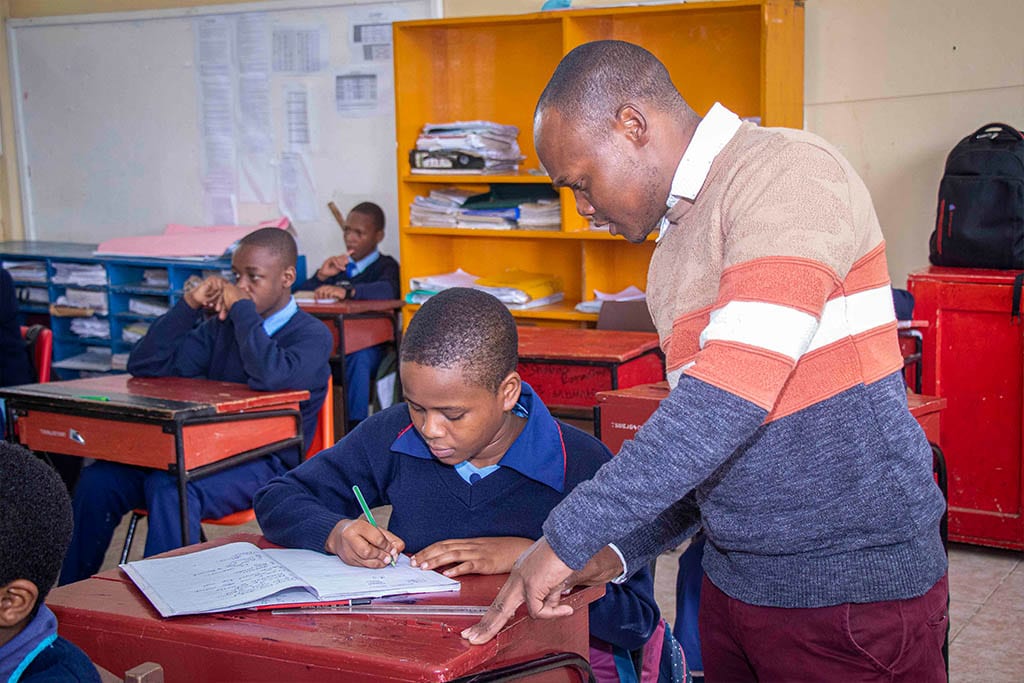
Keenly explaining to students, Mr Ombeni believes wholeheartedly in the importance of social studies and knows that a social aware student can make a real impact.
“For example today’s lesson is about longitude and latitude. I’m teaching the class on how Earth’s 360 degree rotation corresponds to a 24 hour day. This lesson falls under one of the four key topics of social studies.” Mr Ombeni says.
Mr Ombeni’s favourite topic to teach involves Tanzanian culture and history.
“It’s about promoting Tanzanian culture, building good cooperation in the community, and also honouring our heroes… people like the late Julius Nyerere, the founding father of our nation and the late Bibi Titi Mohammed, who helped bring independence to Tanzania. As you know, the mission of our school is to educate future Tanzanian leaders, so when the students learn about those leaders, they become excited. You can see it in their faces… it gives motivation and inspiration to the students,” smiles Mr Ombeni.
Mr Ombeni financially supports his mother and father with different needs and also supports his sister who is about to sit for her Form 6 National Examinations with school needs. He enjoys interacting and assisting students with their lessons whenever they need him to.
“I like working at St Jude’s because it’s a unique non-profit organisation that helps my fellow Tanzanians to achieve their goals and become future Tanzanian leaders,” Mr Ombeni states.
“St Jude’s has also given me the opportunity to interact with many people with diverse knowledge, skills and ideas. I get great joy interacting with the students and knowing that I’m making a difference in a student’s life,” he adds.
It’s easy to see that the students are enjoying the lesson, listening intently to Mr Ombeni as he explains how Earth’s 360 degree rotation corresponds to a 24 hour day. They raise their hands eagerly when Mr Ombeni asks a question and confidently write their answers on the board.
One such student is Rosemary, in Standard 7. Rosemary is an enthusiastic social studies student.
“My favourite part of social studies is learning about the environment and how to take care of it,” says Rosemary.
“Mr Ombeni is a great teacher, whenever I have any questions, I can ask him and he helps me to understand more.”

With a strong foundation in social studies, students, like Rosemary, will move into secondary school ready for more advanced studies in history and geography, thanks to the passion and guidance of Mr Ombeni.
As he reminds us, a key part of the St Jude’s vision is an educated community of moral and intellectual leaders. With strong knowledge of their country, its history and geography, and the exceptional Tanzanian leaders of the past, St Jude’s students have the perfect foundation to fulfil this bold vision.